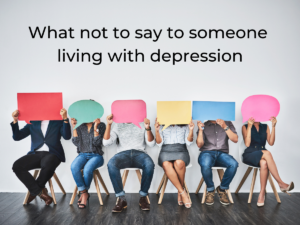What Not to Say to Someone Living With Depression
Language is powerful. Sometimes we think we are saying something helpful, but it is actually harmful. This can be especially true with someone who is living with depression. Here are four categories of speech that are unhelpful when talking to someone who is struggling with depression.
Blaming and shaming
These are statements that blame the depressed person, implying that their depression is their fault. They can also make the depressed person feel badly about themselves.
You’re just looking for attention.
A lot of people don’t reach out for help because they don’t want to make it seem like they are looking for attention. Accusing them of looking for attention can be discouraging.
You’re dragging me down.
Statements like this can make the person with depression feel like a burden or as if they are harming you. You might be feeling stressed but instead of expressing it to your loved one, you can share it with someone you trust in private.
You don’t think about anyone but yourself.
People experiencing depression are not being selfish, they are struggling. Telling them that they are being selfish will only make them feel worse.
I thought you were stronger than that.
A statement like this implies that the person is weak and is a failure at being strong. This can reinforce the person’s own negative self-perceptions.
Why don’t you just grow up?
Statements like this can make your loved one feel like a child. Infantilizing a depressed person can harm their self-esteem, which might already be low.
Giving Advice
We may want to do so much for a loved one experiencing depression, but even if we mean well, telling someone with depression what they should do can be overwhelming. Giving advice might seem like a loving gesture, but it can have negative effects.
You should get out more
Someone with depression may have trouble getting out of bed in the morning, so telling them they need to go out more can seem like an impossible task. This can make them feel despondent.
Stop feeling sorry for yourself
Saying something like this can give the impression that you believe they are only looking for sympathy or pity.
Try harder
Saying this implies that the depressed person is not putting in the proper effort to get better.
You need to stop taking all those pills
Your loved one might be trying to find the right treatment, and this might mean trying different medications. Finding the right medication or treatment can be a long process.
You have control over how you feel
Depression is very powerful and there is no simple fix. Depression can require therapy, medication, and time to heal.
Trying to cheer them up
These statements imply that depression is just “feeling sad” when it is actually a complex disorder. There is much more to conquering depression than just changing your outlook or “cheering up.”
I’d love to see you cheer up
You might mean well, but this can make the person feel like they are letting you down by not being as happy as you want them to be.
Why don’t you smile more?
Depression cannot be cured by smiling. It is a complex disorder that requires proper treatment.
You have such a great life! Why aren’t you happy?
Depression doesn’t care if you have a great life. It affects people from all walks of life, regardless of what they have or don’t have.
Everyone gets depressed sometimes.
This is putting the focus on someone else and not the person who is struggling. It also minimizes the person’s experience of depression.
I know how you feel.
You might be sharing a personal experience to demonstrate empathy, but this can shift the focus away from your loved one’s experience to your own.
Invalidating their feelings
These statements do not make the person feel validated or important. Rather, it can make them feel like what they are experiencing isn’t real or true.
No one ever said life was fair.
This statement can make it seem as if the person’s depression is normal or imagined, instead of being a serious disorder.
You don’t look depressed.
Many people who experience depression do not look like they are struggling. By questioning the person’s appearance, it can seem like you are questioning whether their experience of depression is real.
We all have our crosses to bear.
This suggests that the person is destined to be depressed, that they must simply endure their depression. It also implies that their depression is equal to everyone else’s struggles.
Get over it.
Saying “get over it” implies that the person’s depression is not real. It dismisses their experience. Depression is not something you can simply “get over.” It requires treatment and patience.
It could be worse.
You might intend for your loved one to change their perspective on their situation, but statements like this may make them feel that their struggles are not as important as someone else’s, and that they should be grateful that they “only” have depression.
–Gabrielle Lesage
From Share&Care Winter 2023
Visit amiquebec.org/depression for resources that can help you or a loved one cope with depression.
Visit amiquebec.org/sources for references
Sign up for our emails to stay in touch
Please also follow us on:



